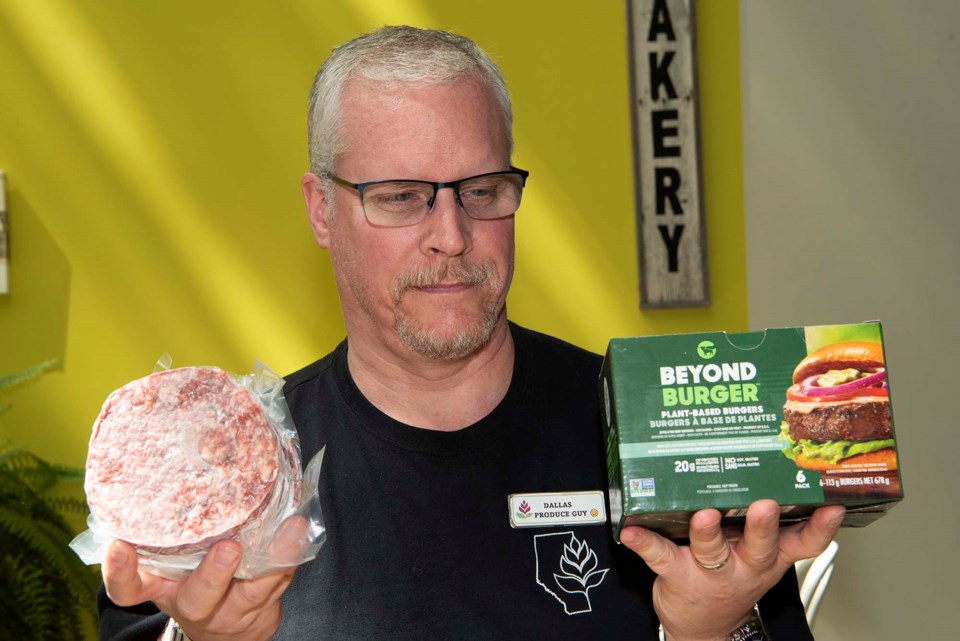How Now Green Cow
How Now Green Cow is examining how our dinners are shaping, and are being shaped by, the climate crisis. Got a food and climate question? Send it to [email protected] so it can be addressed in a future story.
Former St. Albert chef Gidget Bouchard often has meaty dishes on the menu at home, whether it be bacon, pastrami, or shepherd’s pie.
What she doesn’t have is actual meat. Instead, she serves up plant-based meat alternatives, most of which she makes by hand. You may have even tried some of them when she ran Gidget’s Bistro in St. Albert a few years ago.
“I think sometimes when I’m eating the chicken that I have to remind myself that it’s not real [meat]!” she said of her chickpea-based chicken.
Meat-free meats
Animal protein production in the form of meat, milk, and dairy account for about 12 per cent of the world’s heat-trapping pollution, with about 70 per cent of that coming from meat and eggs, the UN’s Food and Agricultural Organization reports.
We can make deep cuts to the carbon footprint of our dinners if we get our proteins from plant-based alternatives for meat. Swap that beef in your spaghetti sauce with lentils, for example and you’ve slashed the amount of greenhouse gases you’ve cooked up by about 97 per cent, data from a prominent 2018 Science study suggests.
Bouchard said she started making and eating plant-based meats back in 2018 to improve her health. It took a lot of experimentation, but figured out how to make omelettes from chickpea flour, bacon from vital wheat, and burgers from mushrooms and lentils.
When she doesn’t have time to make her own, Bouchard said she buys pre-made plant-based meat products from the store, such as the soy-based Impossible Burger and Gusta’s vegan sausages. You can find such pre-made plant-based meats in many St. Albert stores and restaurants (such as Earls and Canadian Brewhouse).
Plant-based meat alternatives run rings around regular meat in terms of environmental performance, research complied by the Good Food Institute suggests.
A 2019 Quantis study of the Impossible Burger found it needed 87 per cent less water, 96 per cent less land, and produced 89 per cent less heat-trapping pollution per burger compared to regular beef, for example, because it did not require cows to make. No cows means no methane-making manure or burps, and no need for land, water, and fertilizer to grow cow feed.
Price-wise, pre-made plant-based meat alternatives often cost slightly more than regular ones, although it’s hard to say given the huge number of products out there. If you make your own, they’re way cheaper.
“A can of chickpeas is about $1.50,” Bouchard noted, and you can get three servings of faux-chicken out of that.
Is it healthy?
Pre-made plant-based meats are considered processed foods and can contain lots of sodium and saturated fat, neither of which are great for your heart, Janna Bokenfohr, a registered dietitian with the St. Albert and Sturgeon Primary Care Network, noted in an email.
“Including processed plant-based meat alternatives on occasion is okay, but consider how these foods fit into your overall diet. How much of your diet consists of processed foods and how much of it consists of whole foods?” she said.
Check the nutrition labels of any plant-based meat products and look for ones that meet less than 15 per cent Daily Value for salt or saturated fat, Bokenfohr said.
Better still is to make your own. Bouchard said there were plenty of vegan recipes out there (see Sam Turnbull’s It Doesn’t Taste Like Chicken blog for examples) and a fair number of vegan dishes in local restaurants.
Bouchard recommended starting small with a Meatless Monday or a month-long Veganuary. If you decide to go cold turkey on meat, consider taking more probiotics to get your gut biome ready.
“It really throws you for a loop in terms of what your body is used to eating,” she said.



